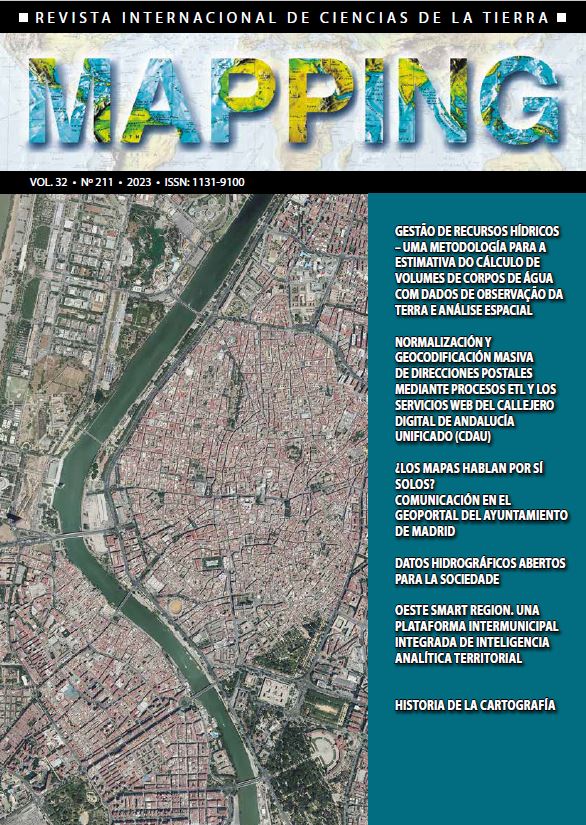Hydrographic open data for society
DOI:
https://doi.org/10.59192/mapping.393Keywords:
FAIR Principles, Hydrography, Marine Spatial Data Infrastructures, Ocean Decade, Open DataAbstract
Hydrography is defined as: “The branch of applied sciences which deals with the measurement and description of the physical features of oceans, seas, coastal areas, lakes and rivers, as well as with the prediction of their change over time, for the primary purpose of safety of navigation and in support of all other marine activities, including economic development, security and defence, scientific research, and environmental protection” (Publication S-32). Due to their broad concept hydrographic data and information provide the foundational bases for marine space management, fisheries, coastal environment, policy decisions, shipping, energy and oil industry, etc. Portuguese Hydrographic Institute (IH) manages geospatial datasets from several scientific and technical domains. Data management has been on daily agenda and always has an internal priority. Facing the digital transformation tsunami and rapid evolution of society data requirements is the main driven for developing an internal sustainable open data strategy aligned with findable, accessible, interoperable and reusable (FAIR) principles and as open as possible. The European Open Data and Open Science strategies combined with the need to fill the ocean knowledge gaps are changing the way how data producers deal with geospatial information. This article presents several IH projects to increase sharing and reuse of hydrographic data by society.
Downloads
References
APA. (2015). Caracterização e Diagnóstico da Região Hidrográfica do Guadiana. Plano de Gestão de Região Hidrográfica. Retrieved November of 2022, from https://apambiente.pt/sites/default/files/_Agua/DRH/ParticipacaoPublica/PGRH/2016-2021/3_Fase/PGRH_2_RH7_Parte2.pdf
Barbier, E. B. (2017). Marine ecosystem services. Current Biology, 27, R507-R510. DOI: https://doi.org/10.1016/j.cub.2017.03.020
CIESIN. (2012). National Aggregates of Geospatial Data Collection: Population, Landscape, And Climate Estimates, Version 3 (PLACE III). Retrieved September 12, 2022, from https://bit.ly/3vIOH3H
Contarinis, S., Pallikaris, A., & Nakos, B. (2020). The Value of Marine Spatial Open Data Infrastructures—Potentials of IHO S-100 Standard tο Become the Universal Marine Data Model. Journal of Marine Science and Engineering. doi:https://doi.org/10.3390/jmse8080564 DOI: https://doi.org/10.3390/jmse8080564
Dias, T. (2021). PROGRAM SEAMAP 2030 – 100% of the Portuguese maritime spaces mapped by 2030. The International Hydrographic Review. Retrieved November of 2022, from https://ihr.iho.int/articles/program-seamap-2030-100-of-the-portuguese-maritime-spaces-mapof-the-portuguese-maritime-spaces-mapped-by-2030/
European Commission. (2018). Turning FAIR into reality - Final Report and Action Plan from the European Comission Expert Group on FAIR Data. Directorate General for Research and Innovation, Directorate B - Open Innovation and Open science, Brussels. Retrieved from https://ec.europa.eu/info/sites/default/files/turning_fair_into_reality_0.pdf
European Commission. (2020). Analytical Report 15 - High-value datasets: understanding the perspective of data providers. Directorate General for Communications Networks, Content and Technology, Unit G.1 Data Policy and Innovation. Retrieved November of 2022, from https://data.europa.eu/sites/default/files/analytical_report_15_high_value_datasets.pdf
European Commission. (2020). High-value datasets. Retrieved November of 2022, from https://data.europa.eu/en/publications/datastories/high-value-datasets
European Commission. (2020). Summary report of the public consultation on the European strategy for data. Brussels. Retrieved November of 2022, from https://digital-strategy.ec.europa.eu/en/library/summary-report-public-consultation-european-strategy-data
European Parliament. (2019). Directive (EU) 2019/1024 of the European Parliament and of the Council of 20 June 2019 on open data and the re-use of public sector information. Official Journal of the European Union. Retrieved November of 2022, from https://eur-lex.europa.eu/legal-content/EN/TXT/?uri=CELEX%3A32019L1024
Government of Ireland. (2020). The new Open Data Directive? What will it mean for public bodies? Retrieved November of 2022, from IRELAND'S OPEN DATA PORTAL: https://data.gov.ie/blog/the-new-open-data-directive-what-will-it-mean-for-public-bodies
IH. (2021). Hidrográfico+ - Nova Infraestrutura de Dados e Informação Geoespacial. Revista da Armada, 27-29.
IH. (2022). Política de Dados e Informação Técnico-Científica do Instituto Hidrográfico. Instituto Hidrográfico.
IHO. (2000). IHO Transfer Standard for Digital Hydrographic Data - Edition 3.1. International Hydrographic Organization. Retrieved November of 2022, from https://iho.int/uploads/user/pubs/standards/s-57/31Main.pdf
IHO. (2014). Specifications for Chart content and display aspects of ECDIS - Edition 6.1(.1). International Hydrographic Organization. Retrieved November of 2022, from https://iho.int/uploads/user/pubs/standards/s-52/S-52%20Edition%206.1.1%20-%20June%202015.pdf
IHO. (2017). Spatial Data Infrastructures "The Marine Dimension" - Guidance for Hydrographic Offices. Publication C-17. International Hydrographic Organization. Retrieved November of 2022, from https://iho.int/iho_pubs/CB/C-17_Ed2.0.0_EN.pdf
IHO. (2019). IHO Input to the Report of the UN Secretary General on Oceans and Law of the Sea. Retrieved November of 2022, from https://www.un.org/Depts/los/general_assembly/contributions_2019/IHOEN.pdf
IHO. (2022). IHO Eastern Atlantic Hydrographic Commision – National Report.
IHO. (2022). Transition to digital data services and other priorities discussed at IHO Council. Retrieved November of 2022, from International Hydrographic Organization: https://iho.int/en/transition-to-digital-data-services-and-other-priorities-discussed-at-iho-council
Lowe, T. (2019, July 4). IHO - Hydrographic Commission on Antarctica. Seminar on the status and the impact of hydrography in Antarctic waters. Item 2.3 - Hydrographic information drives marine knowledge. Czech Republic. Retrieved from https://iho.int/uploads/user/Inter-Regional%20Coordination/HCA/HCA16/HCA_ATCM_XLII_Item2.3_v1.1.pdf
Natural Rsources Canada. (2018). Marine Spatial Data Infrastructure (MSDI) & The Marine Cadastre Application. Retrieved November of 2022, from https://na.eventscloud.com/file_uploads/7752d75b94f61c4b76ec33bb2e25a2cb_7JoseMBalaMSDIL0MCApplication_March27LJ2018.pdf
Neumann, B., Vafeidis, A. T., Zimmermann, J., & Nicholls, R. J. (2015). Future Coastal Population Growth and Exposure to Sea-Level Rise and Coastal Flooding - A Global Assessment. PLoS One, 10(3), e0118571. DOI: https://doi.org/10.1371/journal.pone.0118571
Nunes, Paulo; Saraiva, Sérgio; Almeida, Sara; Veiga, Leonor, et. al. (2022). HIDROGRÁFICO +: A INFRAESTRUTURA DE DADOS E INFORMAÇÃO GEOESPACIAL MARINHA DO INSTITUTO HIDROGRÁFICO. 10as Jornadas de Engenharia Costeira e Portuária. PIANC.
Peckham, O. (2022). ISC Keynote: Digital Twins Aren’t About Making Pretty Pictures. Retrieved from https://www.hpcwire.com/2022/06/01/isc-keynote-digital-twins-arent-about-making-pretty-pictures/
Petrov, O., Gurin, J., & Manley, L. (2016). Open Data for Sustainable Development. (W. Bank, Ed.) Connections. Retrieved from https://openknowledge.worldbank.org/handle/10986/24017 DOI: https://doi.org/10.1596/24017
Ponce, R. (2014). The New Role of Hydrography in the 21st Century. Hydro International. Retrieved November of 2022, from https://www.hydro-international.com/content/article/the-new-role-of-hydrography-in-the-21st-century
SciencesPo. (n.d.). Open Science at Sciences Po. Retrieved from SciencesPo: https://www.sciencespo.fr/recherche/en/content/open-science-sciences-po.html
Soares, C. V. (2020). O Conhecimento Científico do Oceano. Instituto Hidrográfico, Conhecer o Mar para que todos o possam usar (Vol. Cadernos Navais n.º 57). Centro de Estudos Estratégicos da Marinha. Retrieved from https://www.marinha.pt/pt/a-marinha/estudos-e-reflexoes/cadernos-navais/Documents/cadernonaval_57.pdf
UN-GGIM. (n.d.). United Nations Integrated Geospatial Information Framework (UN-IGIF). Retrieved from UN-GGIM: https://ggim.un.org/IGIF/overview/
Wilkinson, Mark D.; Dumontier, Michel; Aalbersberg, Jan IJsbrand; et. al. (2016). The FAIR Guiding Principles for scientific data management and stewardship. Scientific Data, 3(160018). doi:https://doi.org/10.1038/sdata.2016.18
Young, A., & Verhulst, S. (2016). The Global Impact of Data: Key Findings from Detailed Case Studies Around the World. O'Reilly Media, Inc. Retrieved November of 2022, from https://www.oreilly.com/library/view/the-global-impact/9781492042785/
Downloads
Published
How to Cite
Issue
Section
License

This work is licensed under a Creative Commons Attribution-NonCommercial-NoDerivatives 4.0 International License.





